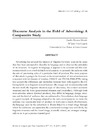Identificador persistente para citar o vincular este elemento:
https://accedacris.ulpgc.es/jspui/handle/10553/5649
| Título: | Discourse analysis in the field of advertising: a comparative study | Autores/as: | Marrero Morales, Sandra Vera-Cazorla, María J. |
Clasificación UNESCO: | 570107 Lengua y literatura 550510 Filología |
Palabras clave: | Advertising Textual analysis Discourse analysis |
Fecha de publicación: | 2007 | Publicación seriada: | LFE. Revista de Lenguas para Fines Específicos | Resumen: | Advertising has aroused the interest of linguists for many years in the sense that they have attempted to describe its language and to discover the principles of its structure. As regards its language, it appears to be concrete and this concreteness leads us to a well-defined social purpose: to persuade the audience with the aim of promoting sales of a particular kind of product. The main purpose of this article is going to be focused on the textual analysis of two advertisements concerned with two brands of watches (TISSOT and PATEK PHILIPPE) taking into account the differences and similarities between them with regard to the following fields: non-linguistic textual features (the image) and its relationship with the text itself; the linguistic situation (type of discourse), the content (semantic structure) and the form (grammatical structure and vocabulary). Although both texts advertise almost identical products, they differ in language, design, structure and the kind of audience they are addressed to. Nevertheless, their language is a good example of language adapted to the same social purpose: to make the audience buy a particular kind of product, in both cases a watch. Furthermore, the language used by the advertisers is closely linked to a visual image through which the addressee can appreciate the commercial message very well. Both, the linguistic structure and the visual image, iconically related, are arranged strategically so as to get a precise material goal. La publicidad ha despertado el interés de los lingüistas durante muchos años en el sentido de que estos han intentado describir su lenguaje y descubrir los principios de su estructura. Con respecto a su lenguaje, parece ser concreto y su concreción nos lleva a un propósito social bien definido: persuadir a la audiencia con el objetivo de promocionar las ventas de un tipo determinado de producto. El principal objetivo de este artículo va a estar centrado en el análisis textual de dos anuncios de dos marcas de relojes (TISSOT y PATEK PHILIPPE) para lo que se ha tenido en cuenta las diferencias y semejanzas entre ellos con respecto a los siguientes campos: las características no textuales (la imagen) y su relación con el texto en sí mismo; la situación lingüística (el tipo de discurso), el contenido (la estructura semántica) y la forma (la estructura gramática y el vocabulario). Aunque ambos textos anuncian productos casi idénticos difieren en el lenguaje, el diseño, la estructura y el tipo de audiencia a la que van dirigidos. Sin embargo, su lenguaje es un buen ejemplo de adaptación al mismo propósito social: hacer que el público compre un tipo determinado de producto, en ambos casos un reloj. Además, el lenguaje utilizado por los publicistas esta íntimamente ligado a la imagen visual a través de la cual el destinatario puede apreciar el mensaje comercial muy bien. Ambos, la estructura lingüística y la imagen visual, relacionadas de forma icónica, están colocadas estratégicamente para lograr un objetivo material preciso. |
URI: | https://accedacris.ulpgc.es/handle/10553/5649 | ISSN: | 1133-1127 | Fuente: | LFE. Revista de lenguas para fines específicos [ISSN 1133-1127], n. 13-14, p. 127-141, (2007-2008) |
| Colección: | LFE, Rev. leng. fines específ. n.13-14, 2007-2008 Artículos |
Visitas
55
actualizado el 10-ene-2026
Descargas
51
actualizado el 10-ene-2026
Google ScholarTM
Verifica
Comparte
Exporta metadatos
Los elementos en ULPGC accedaCRIS están protegidos por derechos de autor con todos los derechos reservados, a menos que se indique lo contrario.
